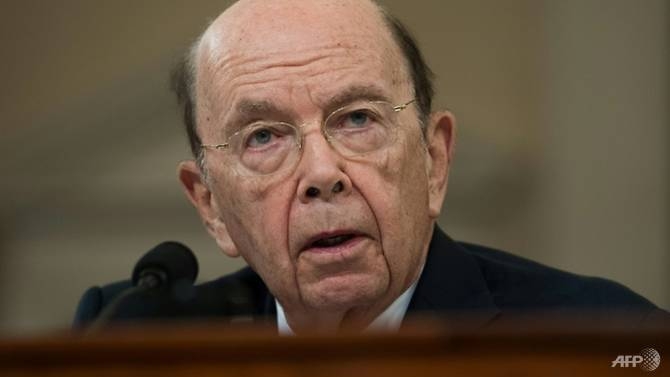Trump administration faces crunch week on trade
 |
| Ross says he wants Beijing to change policies that harm US companies, including forced technology transfers and lack of protection for American know-how. (Photo: AFP/SAUL LOEB) |
High-stakes negotiations will take place with China, the European Union and Washington's two North American Free Trade Agreement partners.
And while the talks have been going on for weeks and months, key deadlines are fast approaching - critically for NAFTA.
NAFTA DEADLINE
Officials have been working furiously to update the 24-year-old trade pact that Trump called "a horrible, horrible disaster for this country."
Trump spoke to Canadian Prime Minister Justin Trudeau on Monday and discussed bringing the talks to quick conclusion, officials from both countries said.
But outgoing House Speaker Paul Ryan said last week he would need a written agreement for the US Congress to approve a revamped trade pact this year, while Republicans still control the legislature - something that could change in November's midterm elections.
The talks are hung up on Washington's demands to increase the US-made components in vehicles that receive duty-free status in NAFTA and the clock is running out.
US Commerce Secretary Wilbur Ross said those and other issues remained a "work in progress" but the trade ministers from Canada and Mexico who were in Washington last week stressed they would not be pressured to reach a deal.
The NAFTA revision is vital for another reason: the exemptions for Canada and Mexico from the steep US tariffs on steel imports expire Jun 1.
Unless officials agree on terms covering steel and aluminum, the tariffs would take effect.
Ross said the tariffs decision would depend on how the talks progressed but added this was "unforecastable at the moment."
EU STEEL QUOTAS?
The EU also faces the same Jun 1 deadline when the tariff exemptions expire. Ross said he would speak with EU Trade Commissioner Cecilia Malmstroem on Tuesday.
"I hope to get a reasonable conclusion," Ross said, but "if not they will go into effect."
He said other countries, like South Korea, had agreed to export quotas that would have the same effect as tariffs but so far European officials "haven't agreed to anything."
The EU continues to insist that as key allies they should be granted a permanent exemption and Brussels says it refuses to negotiate under a tariff threat.
But Ross said he had spoken to his EU counterpart eight or 10 times since the metals tariffs were first announced in March.
CHINA AND ZTE
Also on Tuesday, Vice Premier Liu He - considered President Xi Jinping's right-hand man on economic issues - will head a Chinese delegation to Washington.
The officials will try to find a way to head off a major trade battle after the US threatened tariffs on as much as $150 billion in Chinese imports, while Beijing has targeted $50 billion in US goods in the dispute over China's failure to protect intellectual property rights.
"The gap remains wide," Ross said, but he added he remained hopeful the strong personal relationship between Trump and Xi would "facilitate an agreement, just as it seems to be doing with regard to North Korea."
Ross said his aim was for Beijing to change policies that harm US companies, including forced technology transfers and lack of protection for American know-how.
But he said it is likely Chinese officials also would raise the issue of telecoms giant ZTE, the company that was forced to cease operations after it was cut off from US technology products for violating US sanctions against North Korea and Iran.
Although he said "our position has been that that's an enforcement action separate from trade," Ross said he was exploring "alternative remedies... very, very promptly," after Trump intervened in the case.
ZTE was fined $1.2 billion in Mar 2017, but last month it was hit with a steeper sanction, prohibiting US companies from supplying the firm with needed parts amid revelations the company lied multiple times and failed to take actions against employees responsible for sanctions violations.
But President Donald Trump made a surprise announcement on Twitter on Sunday, offering to intercede to prevent the company from shutting down.
"President Xi of China, and I, are working together to give massive Chinese phone company, ZTE, a way to get back into business, fast," Trump tweeted.
What the stars mean:
★ Poor ★ ★ Promising ★★★ Good ★★★★ Very good ★★★★★ Exceptional
 Tag:
Tag:
Related Contents
Latest News
More News
- Russian President congratulates Vietnamese Party leader during phone talks (January 25, 2026 | 09:58)
- Worldwide congratulations underscore confidence in Vietnam’s 14th Party Congress (January 23, 2026 | 09:02)
- Political parties, organisations, int’l friends send congratulations to 14th National Party Congress (January 22, 2026 | 09:33)
- 14th National Party Congress: Japanese media highlight Vietnam’s growth targets (January 21, 2026 | 09:46)
- 14th National Party Congress: Driving force for Vietnam to continue renewal, innovation, breakthroughs (January 21, 2026 | 09:42)
- Vietnam remains spiritual support for progressive forces: Colombian party leader (January 21, 2026 | 08:00)
- Int'l media provides large coverage of 14th National Party Congress's first working day (January 20, 2026 | 09:09)
- Vietnamese firms win top honours at ASEAN Digital Awards (January 16, 2026 | 16:45)
- ASEAN Digital Ministers' Meeting opens in Hanoi (January 15, 2026 | 15:33)
- ASEAN economies move up the global chip value chain (December 09, 2025 | 13:32)






















 Mobile Version
Mobile Version